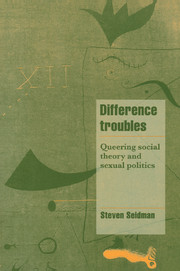Book contents
- Frontmatter
- Contents
- Preface
- Acknowledgements
- Introduction: the contemporary reconfiguring of social theory
- Part I Resisting difference: the malaise of the human sciences
- Part II Engaging difference: from lesbian and gay studies to queer theory
- Part III Democratic prospects: the politics of knowledge and identity
- Epilogue: pragmatism, difference and a culture of strong democracy
- Notes
- References
- Index
Epilogue: pragmatism, difference and a culture of strong democracy
Published online by Cambridge University Press: 05 October 2010
- Frontmatter
- Contents
- Preface
- Acknowledgements
- Introduction: the contemporary reconfiguring of social theory
- Part I Resisting difference: the malaise of the human sciences
- Part II Engaging difference: from lesbian and gay studies to queer theory
- Part III Democratic prospects: the politics of knowledge and identity
- Epilogue: pragmatism, difference and a culture of strong democracy
- Notes
- References
- Index
Summary
If it is true that in many Western nations differences in race, gender, ethnicity, nationality, sexuality, and ableness have been reconfigured from personal matters to public concerns, if, to say it otherwise, differences which were once considered private are now viewed as matters of collective life, this suggests major shifts in the organization of polity and civil society. These shifts have been accompanied by serious reflection about their ethical and political significance. Many critics view these developments and their intellectual defenders as dangerous. The rise of multiple, heterogeneous “quasi-ethnic” collectivities and public cultures is said to threaten civil order and a well functioning, stable democratic polity. Indeed, if some of these differences, as I have suggested in previous chapters, extend into moral and epistemic values, critics rightly ask whether championing a strong sociopolitical pluralism, a public world organized in some significant way in relation to these differences, does not portend endemic moral and social turmoil. Without a core of shared moral and epistemic values, critics wonder, will not a strong defense of social differences turn our national civic and public culture into a moral and political battlefield?
It is this anticipation of a society structured around social difference spiraling into civil war and political crisis that is, for some critics, the principal social logic of undoubtedly a well-intentioned multicultural politics.
- Type
- Chapter
- Information
- Difference TroublesQueering Social Theory and Sexual Politics, pp. 255 - 265Publisher: Cambridge University PressPrint publication year: 1997

